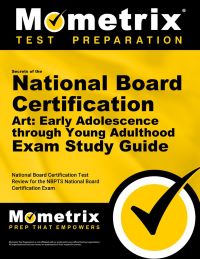National Board Certification Art: Early Adolescence through Young Adulthood Exam
The National Board Certification for Art: Early Adolescence through Young Adulthood is a prestigious certification that recognizes accomplished teachers who meet high and rigorous standards. This certification is designed for art educators teaching students aged approximately 11 to 18+ years. Achieving National Board Certification signifies that a teacher has demonstrated the advanced knowledge, skills, and practices required of an outstanding educator. The certification process is a comprehensive assessment that evaluates a teacher's ability to deliver quality education and foster student learning in the field of art.
Eligibility
To be eligible for the National Board Certification in Art: Early Adolescence through Young Adulthood, candidates must meet specific requirements. Firstly, candidates must hold a bachelor's degree from an accredited institution. Secondly, they must have completed at least three years of successful teaching experience in art education, working with students within the specified age range. Additionally, candidates must possess a valid state teaching license for the subject and age group they are applying for. Meeting these eligibility criteria ensures that candidates have the foundational experience and qualifications necessary to undertake the rigorous certification process.
Syllabus
The syllabus for the National Board Certification in Art is designed to assess a teacher's competency in various areas critical to effective art education. The certification process is structured around the National Board's Five Core Propositions, which serve as guiding principles for accomplished teaching. These propositions include:
- Commitment to Students and Their Learning: Candidates must demonstrate an understanding of their students' diverse backgrounds, interests, and learning needs. They should be able to create an inclusive and supportive learning environment that fosters student engagement and growth.
- Knowledge of Content and Pedagogy: Candidates are expected to possess a deep understanding of art content and pedagogical strategies. They should be able to effectively convey complex concepts, techniques, and historical contexts to their students.
- Managing and Monitoring Student Learning: This involves using various assessment methods to evaluate student progress and adapt instruction accordingly. Candidates must show their ability to design and implement lessons that promote critical thinking and creativity.
- Reflective Practice and Learning from Experience: Teachers should engage in continuous self-reflection and professional development to enhance their teaching practices. Candidates must demonstrate how they have used their experiences to improve their instructional methods.
- Participation in Learning Communities: Candidates should actively engage with colleagues, parents, and the broader educational community to support student learning. This includes participating in collaborative projects, sharing best practices, and advocating for the arts.
Format of the Exam
The National Board Certification process for Art: Early Adolescence through Young Adulthood consists of four components that assess different aspects of teaching practice. These components are designed to provide a comprehensive evaluation of a candidate's abilities and are completed over a period of time.
- Component 1: Content Knowledge This is a computer-based assessment that evaluates a candidate's knowledge of art content and pedagogy. It consists of multiple-choice questions and constructed response items that cover various topics such as art history, theory, techniques, and instructional strategies.
- Component 2: Differentiation in Instruction In this component, candidates are required to submit a portfolio entry that demonstrates their ability to differentiate instruction to meet the diverse needs of students. This includes providing evidence of how they adapt their teaching methods and materials to support individual learning styles and abilities.
- Component 3: Teaching Practice and Learning Environment This component involves the submission of video recordings of classroom teaching, along with written reflections. Candidates must showcase their ability to create an effective learning environment, engage students in meaningful art experiences, and reflect on their teaching practices to improve student outcomes.
- Component 4: Effective and Reflective Practitioner The final component requires candidates to submit evidence of their professional growth and contributions to the learning community. This includes documentation of professional development activities, collaboration with colleagues, and efforts to advocate for the arts in education. Candidates must reflect on how these experiences have influenced their teaching and student learning.
Each component is scored individually, and candidates must achieve a minimum score in each area to earn certification. The assessment process is rigorous and requires candidates to provide detailed evidence of their teaching practices and student learning outcomes.
Conclusion
The National Board Certification for Art: Early Adolescence through Young Adulthood is a valuable credential that recognizes the expertise and dedication of art educators. It provides teachers with the opportunity to reflect on their practice, enhance their skills, and contribute to the advancement of the teaching profession. By achieving this certification, teachers demonstrate their commitment to providing high-quality art education and fostering the creative potential of their students. The certification process is challenging but rewarding, offering educators the chance to join a community of accomplished teachers who are dedicated to excellence in teaching and learning.
Study Guide And Test Preparation For National Board Certification Art: Early Adolescence through Young Adulthood Exam
A Complete National Board Certification Art: Early Adolescence through Young Adulthood Exam Study Guide that includes sample questions, test tips and a complete study plan prepared by a team of expert and dedicated researchers. Cost-effective and qualified exam help from a committed exam preparation company.

